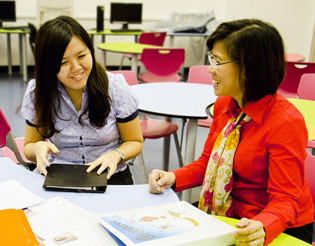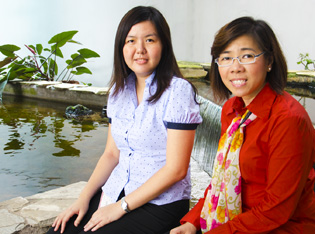Young Children’s Voices in Mathematical Problem Solving
Contributed by Dr Ho Siew Yin and Sng Wei Qin Abbie, from NTUC First Campus, for SingTeach Virtual […]
Read More
Teachers at Mayflower Primary School are on a journey of discovery. Having established a reputation for consistently producing good results, they wanted to reach higher. They wanted to help pupils with the ability to progress further and faster to realize their potential.
The teachers at Mayflower Primary School are a commendable team, by any standard. Between them, they have garnered multiple awards, including Most Inspiring English and Chinese Teachers, and even the prestigious President’s Award for Teachers.
These accolades are by no means a chance occurrence. They are the result of years of honing their craft, of deliberately “Touching hearts, Engaging minds, and Nurturing talents” of young ones, as their school mission asserts.
In recent years ago, they felt they were ready to take on more.
Mayflower has developed many ways to cater to the diverse learning needs of their pupils. Various remedial programmes are conducted for those who struggle academically to ensure that they do not fall behind.
 However, there was a growing concern for a small segment of the student population they refer to as “high-progress” (HP) pupils. Teachers were worried that the potential of these HP pupils was not maximized.
However, there was a growing concern for a small segment of the student population they refer to as “high-progress” (HP) pupils. Teachers were worried that the potential of these HP pupils was not maximized.
“Our school has many programmes in place for the low-ability pupils,” shares Ms Teo Swee Huang, Subject Head of Innovation. “We felt that more must be done to stretch our HP pupils and meet their needs.”
“The kids know so much and that is why they can’t sit still,” adds School Staff Developer Mrs Jessie Ching-Yip. “They are not engaged with our ‘chalk talks’, so what do we do?”
“We realized that although we can put them into HP classes but if we don’t train the teachers, it will be up to individual teachers’ capacity or ability. The changes would not be impactful or sustainable,” notes Swee Huang.
The school then decided to design a comprehensive structured approach to facilitate continual progress and support for teachers in providing more effective differentiated instruction for their pupils. Thus began their journey of discovery.
“We call it the Découvrez approach,” shares Swee Huang. Meaning “discover” in French, Découvrez encapsulates a spirit of learning that both teachers and pupils can aspire to.
– Swee Huang on the importance of teacher learning
Teachers began to work towards helping pupils develop the spirit to explore content beyond the textbooks. Pupils were also encouraged to learn independently and make discoveries on their own.
“We do not want them to be spoon-fed,” Swee Huang notes. “We equip them with the skills for self-directed learning.”
This discovery process is not limited to pupils, but extends to teachers as well. “Teachers should themselves be learners before they can guide the pupils,” notes Swee Huang. In a nutshell, Découvrez is all about equipping teachers with the knowledge and skills in differentiation to meet the needs of their HP pupils.
But before teachers are able to cater to the needs of their HP pupils, they first need to be able to identify them. Therefore, the teachers are also introduced to the characteristics of high-ability learners.
The importance of teacher learning to support pupil learning was what sparked Mayflower to come up with a platform for these teachers to share with and learn from each other.
At the heart of this teacher learning process is an active committee known as the “HP committee”. It comprises like-minded teachers who are dedicated to engage HP pupils during lessons and maximize their potential.
Teachers need not feel alone when dealing with HP pupils as they now have the opportunity to learn from one another. During professional learning team sharing sessions, teachers, new or experienced, are encouraged to share their success and challenges.
“We want the sharing of knowledge,” Swee Huang says. From the sharing sessions, she also feels that teachers now have the opportunity to give opinion and feedback regarding teaching methods in a professional environment.
 In the spirit of sharing, the teachers also started compiling training notes and their own lesson plans that they have found useful. These are shared with all teachers so as to grow the pool of resources and ideas from which new ones can be added on to.
In the spirit of sharing, the teachers also started compiling training notes and their own lesson plans that they have found useful. These are shared with all teachers so as to grow the pool of resources and ideas from which new ones can be added on to.
“This is a resource file which teachers can use according to their needs,” says Swee Huang, who believes that teachers themselves must be continually learning in order to groom such learners.
In this resource file is a tool called the unit modification planner. Fondly known as the “UMP” to Mayflower teachers, the planner is a thinking tool that helps teachers to differentiate in terms of learning outcomes for their HP pupils.
This is a working file which teachers can continually add resources to. As they grow in their knowledge of teaching HP pupils, the pool of resources also expands. “This is not about chalk and talk,” notes Swee Huang. “This is to build and grow the knowledge.”
Jessie also adds that from her experience with the HP committee, such lesson planning has different demands and may be a challenge for starters. “There might be a lot of uncertainties to plan such a lesson but to get started is the way to go,” she advises.